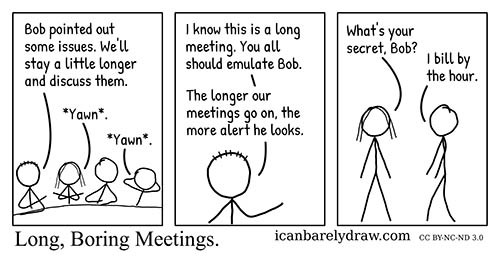I’ve written about this topic a couple of times before — for example, in this post. I was thinking about a new angle on it recently — essentially “Why are meetings typically awful?” — and I came to a different line of thought. Bear with me.
A couple of years ago, I worked for ESPN. I switched roles a few times while I worked there, so towards the middle of my time there, I was pretty low on the totem pole in a new role. (It was one of those jobs whereby no one really knows exactly what you do.) Because the job lacked definition, I would often do one or two things repeatedly and then, on days where I had a lot more motivation, I would schedule meetings with people looking for more clarity on my exact role, etc.
Here’s what happened, often: people with more clout (those who could be defining my job role more directly) would be coming from another meeting. I wouldn’t have had any meetings all day. One time, my boss — my direct boss — came to a meeting I had scheduled with attempts to get some more clarity / responsibility and asked me, “Hey, what’s this meeting about?” (At the time, I was heartbroken.)
But think about it like this: let’s say there are five to eight people in a given meeting, if you follow the ol’ Jeff Bezos “two pizza rule.”
Out of the — let’s say — eight people, they can fall into different buckets:
- Meeting leader (owns the content and pacing)
- People that will execute what happens after the meeting
- People tangentially connected to the ideas
- People invited for political purposes
- Other
Out of those categories, you have these other categories:
- Is in 5+ meetings that day
- Doesn’t view this meeting as related to their primary job
- Has stuff going on at home
- Is focused on another project primarily at this time
- Other
Here’s the bottom line: the investment in a given meeting is almost never at the same level for all people in the meeting.
Let’s say you had a workout group, right? Let’s say the workout group had eight people in it. Let’s say three were focused intensely on fitness and getting stronger, etc. Let’s say 1 couldn’t care less, 1 just wanted to text in the class instead of doing cardio, 1 showed up late, etc. Do you think this would be an effective fitness group overall? Probably not.
But that’s literally what happens 100s of times a day, all over office buildings.
The solution is pretty basic but not a lot of people embrace it:
1. Less meetings — replace them with more “organic” check-ins or shorter, fixed-format concepts
2. Only call a meeting if a meeting is the absolutely necessary format for it — could it be something else? Like an e-mail?
3. Only invite (initially) the people who the project directly affects — avoid the political and tangential invites at the beginning
4. Figure out other ways — that work for your organization — to organize and transfer knowledge from group to group


One Comment
Comments are closed.